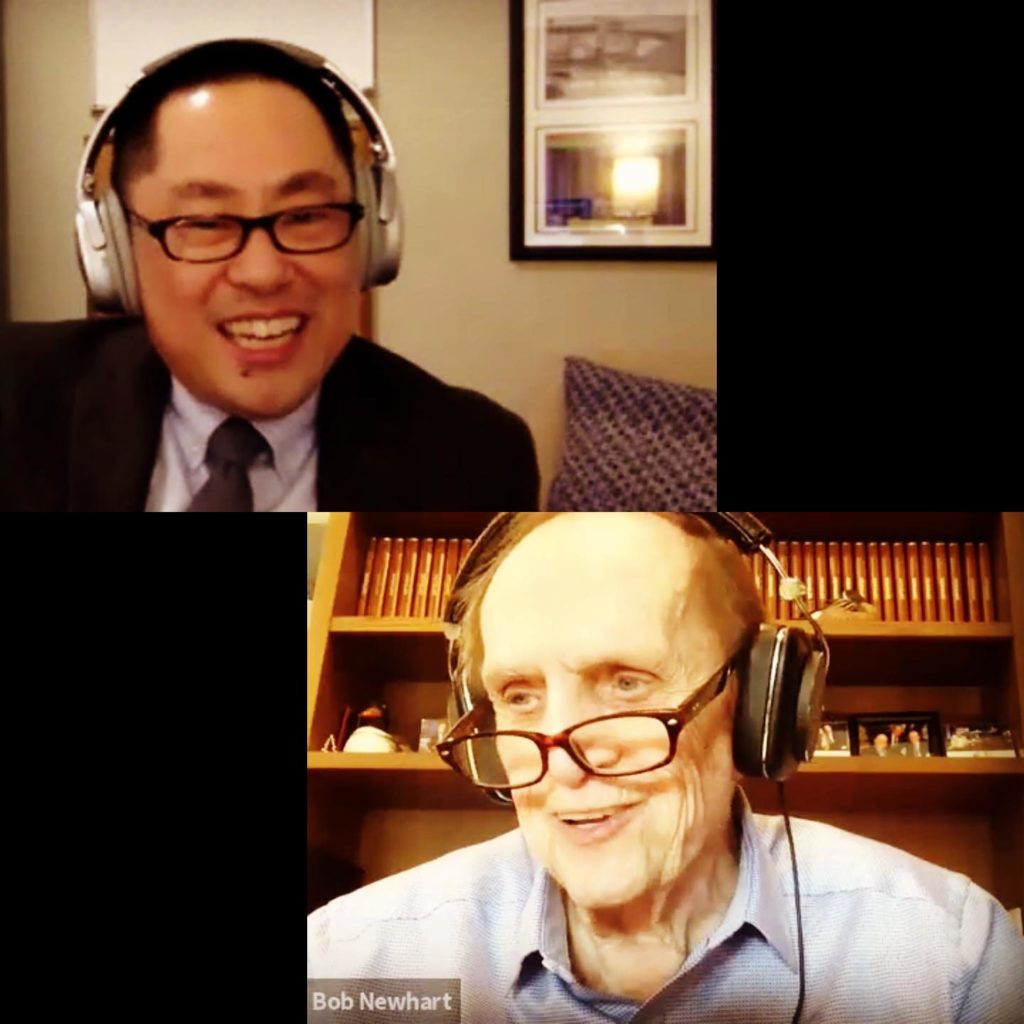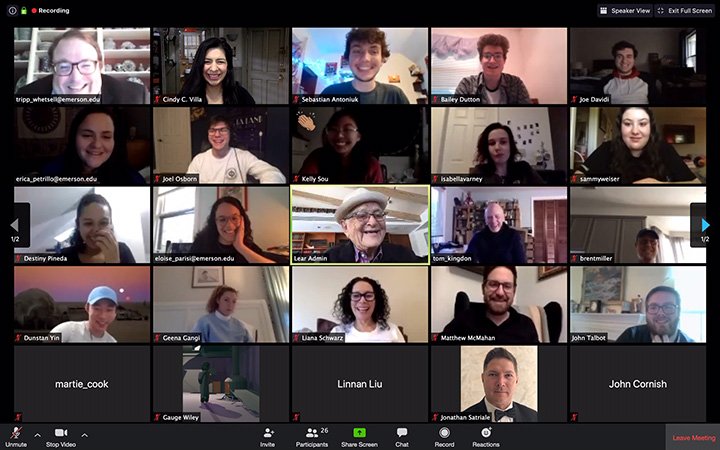Learning from Legends: Comedy Greats Drop by Emerson Classrooms

By Erin Clossey
When comedian and television star Bob Newhart heard that Emerson had an academic program devoted to comedy, he reached out to Emerson Los Angeles Academic Director Mikhail Gershovich and offered to teach a master class.
The class was scheduled to take place April 10 at Emerson LA’s campus on Sunset Boulevard, but the COVID-19 pandemic derailed that plan. So on April 23, Newhart logged onto Zoom to chat with roughly 45 students about his career, answer their questions, and listen to them pitch concepts for comedy bits.
Assistant Professor Ed Lee, a comedy writer, was planning to fly to Emerson LA for the original date and whose students were invited to join the Zoom class. He said Newhart’s interest in speaking to students was “testament to having the first-in-the-nation Comedic Arts BFA.”
“Bob really did appreciate that there is a program that takes comedy seriously as a field of study,” Lee said. “On more than a few occasions he talked about the importance of comedy, especially in tough times.”
Newhart wasn’t the only comedy legend to offer advice and hard-won experience to Emerson students this spring. The previous week, TV writer/producer and Emerson alumnus Norman Lear ’44 Zoomed into affiliated faculty member Tripp Whetsell’s class on … legendary TV writer/producer Norman Lear.
“Norman’s imprint is on so many TV shows … Virtually every genre in American television today owes a credit directly or indirectly to Norman Lear,” Whetsell said. “I was very honored that he agreed to [join the class], especially given the circumstances now.”
Students and faculty in the Newhart class heard the comic’s origin story, from ill-suited accountant to seeing his debut stand-up album reach #1 on the Billboard charts six years later.
They learned that he considers the late Richard Pryor a master of comedy (“I think he’s the seminal comedian of the past 50 years. It’s hard to go into a comedy [club] and not see someone doing Richard Pryor.”).
They heard about his time at CBS doing The Bob Newhart Show and later, Newhart. That the latter show’s famous series finale – when Newhart wakes up next to his co-star from The Bob Newhart Show and discovers that the entire run of Newhart was a dream – was his wife’s idea.
He shared the source of his distinctive style (“I stammer, it’s not an affectation, that’s the way I speak, so that pretty much directed what kind of humor I went into.”), and his thoughts on stage fright (“You should get nervous. That’s not the most natural thing to do, to walk on stage and say, ‘I’m gonna make you laugh for 20 minutes.’”).
Comedic Arts major Natalie Bartlett ’20 called Newhart one of her “main comedic influences;” when she learned he might be coming to teach a class at Emerson, “I practically lost my mind.”
She said she was most struck by Newhart’s commitment to his own creative vision, that he didn’t try to be another Lenny Bruce or Don Rickles or anyone other than himself.
“I think maintaining the integrity of your comedic voice is really hard. It can be so tempting to try to do what other people are doing because they’ve already proven it works,” Bartlett said. “But he made it seem really simple. You stick to your own voice because it’s what makes you stand out. It’s what makes you actually worth watching.”

Few people’s voices or bodies of work have stood out more than Norman Lear, who took the American sitcom from harmless escapism to edgy social commentary in the 1970s with classics such as All in the Family, Maude, The Jeffersons, and Good Times.
Whetsell ’94, an entertainment journalist who teaches a seminar on the man he called a “personal hero of mine,” as well as a class on the history of comedy, said most of his students don’t begin the semester with a deep knowledge of Lear’s work, the bulk of which aired decades before they were born. But Whetsell takes them through a “deep dive” of all of his shows, spending a couple of weeks on each. He starts the class with a primer on the early days of television, and how the American family was depicted in the 1950s and ‘60s.
By the time Lear showed up on their Zoom screens earlier this month, “they were blown away,” Whetsell said.
“They were just in awe to sort of see him up close,” he said. “They submitted very good questions, they were really very insightful.”
Lear kicked off the session with a rendition of an Emerson school song and a paean to his truncated time at Emerson (he left after a little over a year to enlist in World War II). “I loved every split second of it,” he said.
Soon the students were asking him about Maude star Bea Arthur (“Beatrice Arthur made me laugh in places in my body I didn’t even know existed.”), about the recent reboot of his 1970s sitcom One Day at a Time, and whether he knew at the time he was making them that his shows would change American TV.
“As writers, we were hoping to tell a good story, and as a producer I prayed I had cast the best way to deliver the stories and characters. Everything that came from that was a bit of a surprise,” Lear said. “I knew the subject matter we were doing hadn’t been done on TV before, but … nothing we were doing was foreign to an American audience, it was all what families were going through.”
One student asked Lear for his advice to young screenwriters trying to break into film or TV.
“The best advice anybody ever gave a writer is to write. Don’t stop writing,” he said. “Then the fight is to get it read by the right people, and you have to make up your mind that you don’t care about being a pain in the neck, — and actually perhaps you don’t even believe you will be –so you have to knock on the same door 11 times before you get someone to read the script.”
Isabella Varney ’21 said she took Whetsall’s class because Norman Lear is referenced in practically every Comedic Arts class she’s taken for her major, so she wanted to delve into his legacy a little deeper.
“Meeting Norman Lear over Zoom was truly so lovely,” she said. “He made a point to say each of our names before answering our questions, which really made it a more personal experience. I was also surprised that he seemed as excited to meet us as we were to meet him, which was so sweet.”
John Talbot ’21 is a big fan of Lear’s #breakfastthoughts series on Instagram and bonded with him over their shared love of tangerine juice. He said he realized before meeting him that the 97-year-old Lear was a “very young soul,” but he still was surprised when he began belting out the Emerson alma mater within the first minute.
“He had some really interesting perspectives on life, with the one that I remember most being his outlook on the past, present, and future. I found it really insightful that he doesn’t think too much about the past and future, and just focuses on the present and what he’s grateful for,” Talbot said.
When asked about the moment he’s most proud of, Lear told the class that his “reflexive” answer is now, “because it’s the moment I’m living.”
“I love looking at this screen and seeing all of you and taking these questions,” Lear said. “This is it, this is our moment.”
Categories